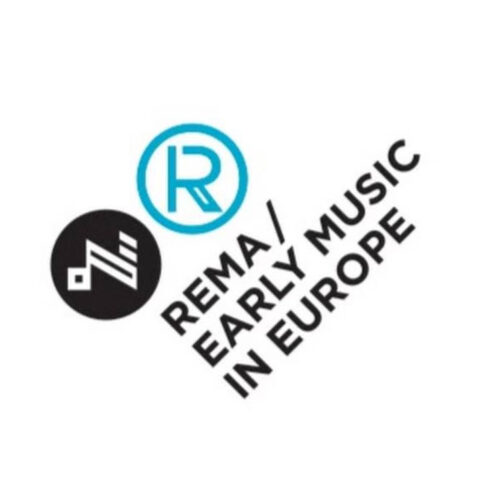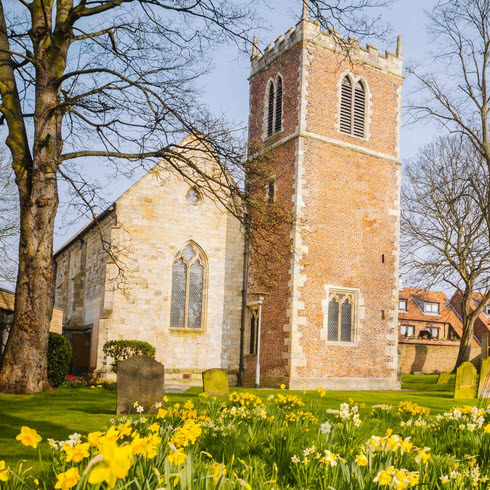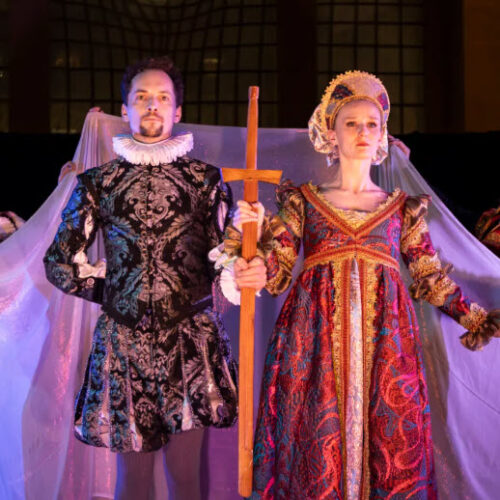by Anne E. Johnson
Published July 3, 2025
Georg Reutter’s Dafne fits perfectly with Amherst Early Music’s 2025 Baroque Academy theme of ‘Music of the German Lands’
‘In the Baroque period things were not tame. It’s a misconception for people who don’t really know Baroque music. The real Baroque is completely wild.’
There’s nothing unusual nowadays about a Baroque work being given its first production since the era when it was composed. Some companies, such as Opera Lafayette and Ars Minerva, even specialize in presenting modern premieres of 17th- and 18th-century operas. What’s unusual about the upcoming modern premiere of Georg Reutter’s Dafne (1734) is not that it’s been unheard for nearly 300 years, but that the work will be performed by students.
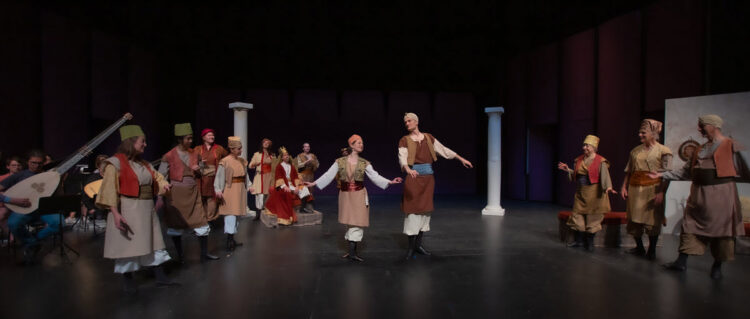
Amherst Early Music produces an annual Baroque Academy, which most years includes an Opera Project. The weeklong 2025 workshop, culminating in a performance July 4 at Muhlenberg College in Allentown, Penn., will be devoted to Reutter’s opera. And a handful of early-career singers will have the rare privilege of creating Baroque roles.
It was the production’s music director, Richard Stone, who found the opera while on “an expedition that began as a search for orchestral music,” he recalls. “I went to the abbey at Heiligenkreuz in Wienerwald, a day trip’s distance outside Vienna. Reutter’s son entered the Cistercian order there in the 18th century and brought what he had of his father’s music with him.” With the abbey’s permission, Stone photographed every manuscript page available, including the score and libretto of Dafne.
He then created a new edition and translation of the opera. The original plan to present it in 2020 was derailed by COVID. Finally the opportunity has come around again, as part of Amherst Early Music’s Baroque Academy 2025 theme, “Music of the German Lands.”
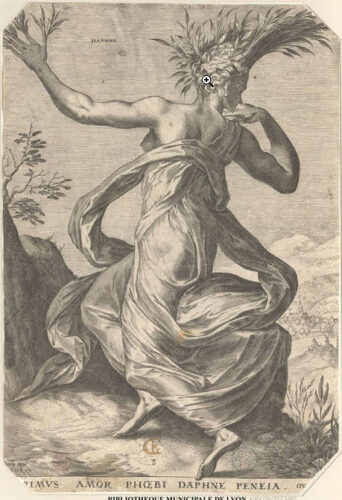
“It’s adorable,” Stone says of Reutter’s one-act comic piece. “It’s the Daphne story, but it’s not particularly a sad version. And it’s not the usual Daphne myths out of Ovid.” This opera brings in Leukippos, a young man who dresses up as a woman so he can frolic with Daphne’s fellow virgin huntresses. “In our version, Leukippos is competing with Apollo for Daphne’s love,” says Stone, “and in the end nobody gets her because she turns into a tree.”
Stone describes Reutter as primarily a vocal composer with an individual style as distinctive as Handel’s or Vivaldi’s. “The music is drop-dead gorgeous. It’s very tuneful; it’s very inventive.” Stone will be conducting the instrumental ensemble, comprising musicians who have their own track of workshop sessions under Saskia Coolen and Hsua-Wen Chen. “We bring the orchestra in for part of the day to rehearse with us,” explains Stone. “But most of the work is going to be with the singers.” The orchestra will include around 20 musicians, who will be onstage with the cast.
The original instrumentation is unclear, he says. “What survives is a presentation score that shows the minimal compositional framework of the music — the musical lines — without detailing all of the instruments that might have been playing in the pit back at its 1734 premiere.” Although no woodwinds are specified in the score, Stone plans to include them. “As this piece was written to celebrate the name day of Empress Elizabeth Christina, having a string section without woodwinds would be like a birthday cake without icing.”
When she joined the creative team, stage director Nell Snaidas found herself wondering, “Why would they choose this piece for her? So I started to go down the Empress Elizabeth Christine wormhole.” Snaidas learned that Christine “was under tremendous pressure to produce a male heir,” leading her to have “really a kind of tortured life.” This discovery illuminated the appeal the myth may have held for the Empress, says Snaidas: “She loved to hunt, and this is about Daphne, who is a follower of the huntress goddess Diana. They don’t want to have anything to do with men, and they’re happy to be chaste amid the trees and the wildlife.”
The title role of the huntress Dafne will be played by Julie Knott, who just finished her first year in the historical voice master’s program at Peabody Institute in Baltimore. Originally cast as Dafne’s friend, Dorinda, she got the call when a scheduling conflict suddenly opened up the lead role in late May. Knott says she is inspired by what she’s learned about the background of the opera. “There’s a lot to think about outside of the music, which is kind of my favorite place to be when I am prepping a role. Yes, the notes on the page matter, but why do they matter, and how did they matter at the time, and how can that influence how they matter today?”
Stone was impressed with all the audition videos they received. “It was a very hard decision,” he says. “We could have basically cast the opera three times over,” agrees Snaidas, who describes the cast’s age range as “between 19 and maybe 45,” mainly music students and young professionals.
As advanced as these workshop participants are, says Snaidas, they will have something to learn. “With younger singers, you zoom in on where they are and try to figure out where they really need the most support.” This often includes a singer who “has a glorious voice but they haven’t figured out how to be understood in the language that they’re singing.” That’s where language coach Lawrence Rosenwald comes in, a part of the Amherst instructional team since 1982. Referring to himself as an all-around “word guy,” Rosenwald helps the students with diction and other related skills. He will also create (and recite) a rhymed prologue as well as writing the supertitles. He says his coaching job includes “explaining on a word-by-word basis what they’re singing,” pointing out that “this is the crucial word here, and these are the uncrucial words.”
However, he won’t attempt to train the singers in historical pronunciation specific to an Italian opera in 1734 Vienna. Although it brings up interesting questions, he says, it just isn’t practical in a short workshop to teach “pronunciation that’s significantly different from what the singers already know.”
Stone identifies recitatives and improvisation as two areas where the students might need work. “There’s a certain collaborative aspect to Baroque music where the composer writes out a lot of it, and there’s an expectation that the performer is going to add some flair to it, extra notes.” The opera’s vocal coach, Jennifer Ellis Kampani, who teaches at University of Southern California, will focus on these elements of vocal style. Her priority is to be sure “Richard and Nell and I will all be on the same page with the pacing, with the sound, and the amount of ornamentation.” Kampani’s coaching will happen each morning while the orchestra is rehearsing on its own.
Snaidas wants to use her rehearsal time with the singers to encourage big performances. “It’s important for young singers to be given the permission to play and be as theatrical as possible because in the Baroque period things were not tame. I think that is a misconception for people who don’t really know Baroque music. The real Baroque is completely wild.” Her staging sounds like it will have some wild elements: Dafne’s transformation into a tree, she says, will happen in front of the audience.
The singers will also receive movement training from co-choreographers Dorothy Olsson and Peggy Murray, which Snaidas considers crucial. “Being among dancers teaches you a lot about how to move and how to hold yourself. It’s a part that is woefully missing in the conservatory model.” There’s a practical element, too, in “learning how to walk onstage in a period gown if you have to walk backwards or you have to get up and down a staircase. It’s not easy.”
In a way, Rosenwald is there to backstop the movement training. “The kind of language work I do with the singers involves some rudimentary gesture coaching. They have to know which words mean what. It’s one thing to know that there’s a gesture for the gods or monsters or hell, and it’s another thing to know which words in the text you’re singing refer to those things.”
These are lofty teaching goals without much time to execute them. The Academy starts June 29, with the performance six days later. “On a certain level, we have to be very simple,” says Stone. Everyone is expected to show up with their parts memorized. “It’s an insanely short amount of time to put up an opera with costumes, with staging and lighting and an orchestra,” says Snaidas. “So you have to be practical. It’s really quite a juggling act.” She’s grateful that the Reutter opera is “a tidy one-act, not like you’re trying to put on some three- hour opera.”
She is ready for anything. “Since you are working with students, you’re not sure who’s capable of what,” she says. “You have to have different layers of possibility. If things go fast, we can do exhibit A, and if it slows down, we can take a few colors out of that and go to exhibit B.”
“I am sure there’s going to be somebody there who needs more help than the others,” agrees Kampani. “I think I’ll just have to wake up every morning and see how it goes. We will all have to be flexible.” The coaching is tough to fit in. “The first couple of days before the singers are learning their blocking, you can be especially attentive to their pronunciation,” says Rosenwald, “but after that, they need to know where they’re going to be and what they’re going to do with their hands.”
Faced with those hurdles, maybe a modern premiere is more than students can handle? Snaidas doesn’t think so. “It’s a safe environment, an educational environment, and it’s understood that we’re not at the Met.” And, she says, there’s the financial reality: “Support for the arts is in a changing place,” and this way a modern premiere “can be sponsored by an organization that is interested in this kind of music, specializes in this kind of music. We can take the time to workshop it.”
As she prepares to play Dafne, Knott is aware of the challenge of putting the whole opera together in a week. But she’s looking forward to the “fast-paced setting where you’re just immersed in the show and in the art,” she says. “That’s what the real world is: You get it on its feet, and you go.”
Another big responsibility she relishes is creating a role. Knott recalls a previous experience being the first to play a character: “I did a workshop at Peabody of newly composed operas by student composers. It’s a really exciting process to create for the first time a role and a vision.” This is a special thrill with Baroque music, she says: “There isn’t a preconceived notion of how this role sounds because somebody else did it and added their own fantastic ornaments that became canon. It’s still your own path.”
Another argument for doing a modern premiere with students is the opportunity to share the joy of discovering unknown works. “It’s a passion of my own to learn about the composers who really had great talent who aren’t known,” says Stone. He’s always wondering, “What am I missing out on? Those are the composers I personally seek out. I share that enthusiasm with my students in the courses that I teach.” He wants his students to expand their understanding of the Baroque. “It’s not just Handel and Bach and Vivaldi.”
Like Knott, who studies with him at Peabody, Stone’s love of discovery started with modern music when he was a student. “A really important influence on me was my guitar teacher, David Starobin. He was all about new music for guitar, and all of it was stuff I’d never heard before. I think his enthusiasm for what is new and exciting out there rubbed off on me. I found that in Baroque music there is so much that we don’t already know that’s worth knowing.” Stone’s ensemble, Tempesta di Mare, often focuses on unknown works. “We’re always looking for that thing that you can’t hear elsewhere,” he says. “Everyone wins.”
Anne E. Johnson is EMA Books Editor and frequent contributor to Classical Voice North America. She teaches music theory, ear training, and composition geared toward Irish trad musicians at the Irish Arts Center in New York and on her website, IrishMusicTeacher.com. For EMA, she recently wrote about Lobster and Blue Hill Bach on the idyllic Maine coast.

